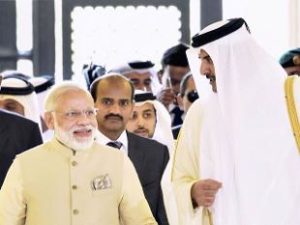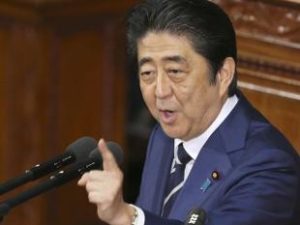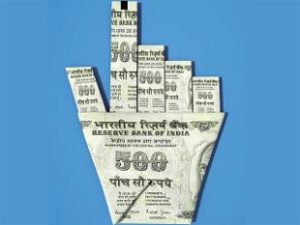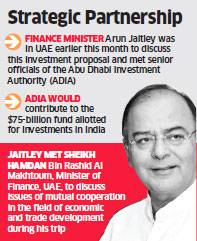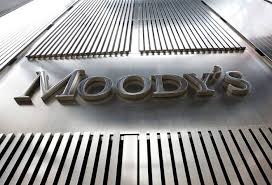
Amid fears of the global economy edging close to recession, India and UK have agreed to open up trade and markets to support growth, carry out structural reforms and address issues related to cross-border tax evasion.
After talks between India’s Finance Minister Arun Jaitley and UK Chancellor of the Exchequer George Osborne, the two nation’s agreed to boost economic ties particularly in areas of infrastructure and financial services and renewed pledge for autonomical exchange of tax information from 2017.
“From the Indian point of view, we were extremely interested in having the British investors look at infrastructure investments in India for which various possibilities were discussed,” Jaitley said after the talks.
India, he said, is “extremely keen that large British companies, particularly involved in infrastructure financing, start investing in Indian infrastructure”.
The two nations will work together for developing an India-UK partnership fund under the umbrella of National Investment and Infrastructure Fund (NIIF) recently created in India.
“This fund will seek to increase flows of private sector capital and expertise alongside multilateral support into Indian infrastructure,” a joint statement issued after talks said.
The world’s fifth largest economy will work on development of smart cities in India. New Delhi is also looking at London for issuance of rupee-denominated bonds to get UK investors to fund its infrastructure projects.
“The possibility of their investing, either directly in projects or through the National Investment and Infrastructure Fund (NIIF) that we have created, were both discussed,” Jaitely told reporters at the Indian High Commission here.
With the IMF warning of global economy being close to recession with 3.4 per cent growth this year, the two sides said they “remain concerned that global growth is falling short of expectations and that the risks to the global outlook have increased”.
“In this regard we stand ready to take the necessary steps to open up trade and markets to support growth and jobs, and agree on the importance of structural reforms and pursuing credible fiscal policies,” the joint statement said.
The joint statement talked about advancement of cooperation in a range of sectors including infrastructure financing, addressing issues of cross-border tax evasion/ avoidance besides opening up of the Indian legal sector to foreign lawyers.
“The UK and India share a common commitment to address cross-border tax evasion and avoidance. Both sides have committed to the Common Reporting Standards (CRS) on Automatic Exchange of Tax Information and will begin exchange in 2017,” the statement said.
“We call on other countries to meet the commitments they have made and to implement the new standard on time,” it said.
During the talks, which included senior representatives from Finance Ministries, Central Banks and key regulators of both countries, the two leaders discussed ways to strengthen the Indo-UK existing economic partnership in order to further boost trade and investment, and to build on the success of Prime Minister, Narendra Modi’s recent summit with his British counterpart David Cameron in the UK.
“Given the fact that even in a somewhat difficult global scenario, India is managing a reasonable growth rate, this is one of the better options that investors have and that kind of a sentiment gets really echoed in the meetings with the investors that we had. Of course, the investors are also keenly watching which way our reform process in India goes,” Jaitley said.
The two nations agreed to work together on building commercial and regualtor-to-regulator links that can underpin further fintech growth in both countries.
“The UK and India agreed to renew the existing mandate of the India-UK Financial Partnership, and building on the re-establishment of the CEO Forum,” the statement said, adding that potential areas of interest for the India-UK Financial Partnership could be reinsurance, international use of the rupee, role of financial technology, financial inclusion, investor protection and green finance.
“The global economy is facing serious challenges and therefore the estimates of global growth also have been repeatedly lowered. Compared to how various countries across the world have been doing, India’s growth rate despite these challenges is probably the highest in the world among major economies,” Jaitley said, in reference to his meetings with investors at Goldman Sachs and London Stock Exchange.
As a follow up on Prime Minister Modi’s announcement during his UK visit last November on the listing of Rupee bonds in London, the minister said, “the UK is very keen for these to be listed in London and broadly the economic and financial dialogue was carried further”.
During the dialogue, the two sides recognised that as the leading financial centre in the world and in the view of successful issuance of Masala bonds issued by the International Finance Cooperation last year, London will be an attractive location for issuance of rupee-denominated bonds.
“The bonds, which were first announced during the visit of Prime Minister Modi to the UK in November, illustrate the crucial role that the UK’s capital markets can play in an enhanced economic relations relationship with India, with UK investors providing financing for the transformation of India’s infrastructure and continued rapid economic growth,” the statement said.
India and the UK also agreed that the development of deeper markets in rupee-linked products, and the increasingly sophisticated relationship between the Indian and UK financial sectors, are important underlying factors in fostering an enduring economic and financial partnership.
Both sides agreed to continue working closely on the development of smart cities in India.
“We will continue to build on and further embed the existing Technical Assistance Partnerships that were announced during Prime Minister Modi’s recent visit to the UK, and to continue working together on research collaboration and other measures to support India’s 100 Smart Cities programme,” the statement said.
While noting the strength of the economic outlook for both countries, the two sides expressed concern that global growth is falling short of expectations and that the risks to the global outlook have increased.
“In this regard we stand ready to take the necessary steps to open up trade and markets to support growth and jobs, and agree on the importance of structural reforms and pursuing credible fiscal policies in order to raise living standards,” it said.
India and the UK also agreed to work together with the aim of developing an Indo-UK partnership fund under the umbrella of the NIIF. The fund will seek to increase flows of private sector capital and expertise alongside multilateral support into Indian infrastructure.
The working group to be established will report back within the course of 2016 on a proposed fund strategy and delivery approach, the statement said.
“As part of this, India and the UK also both recognise the importance of identifying the sector or sectors where there is greatest potential for developing sustainable project pipelines, and of developing a supportive institutional environment for investment and delivery,” it said.
Source:http://economictimes.indiatimes.com/articleshow/50650198.cms
